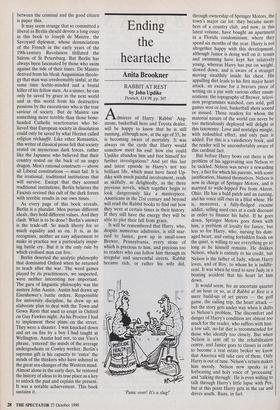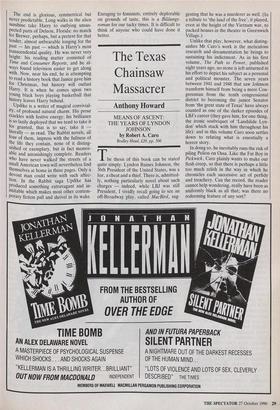Ending the heartache
Anita Brookner
RABBIT AT REST by John Updike
Deutsch, £14.99, pp. 505
Admirers of Harry 'Rabbit' Ang- strom, basketball hero and Toyota dealer, will be happy to know that he is still running, although now, at the age of 55, he is becoming aware of mortality. It was always on the cards that Harry would somehow meet his end: how else could Updike abandon him and free himself for further investigations? And yet this last and latest episode in Harry's not too brilliant life, which must have faced Up- dike with much painful involvement, reads as skilfully, as delightedly, as the three previous novels, which together begin to look dangerously like a masterpiece. Americans in the 21st century and beyond will read the Rabbit books to find out how they were at certain times in their history. If they still have the energy they will be able to plot their fall from grace.
It will be remembered that Harry, who, despite numerous adulteries, is still mar- ried to Janice, grew up in small-town Brewer, Pennsylvania, every stone of which is precious to him, and precious too to readers who can follow him through its irregular and uneventful streets. Rabbit became rich, or rather his wife did, `Panic over! It's a slug!' through ownership of Springer Motors, the town's major car lot: they became mem- bers of a country club, and now, in this latest volume, have bought an apartment in a Florida condominium, where they spend six months of the year. Harry is not altogether happy with this development, although Janice is doing well on it: tennis and swimming have kept her relatively young, whereas Harry has put on weight, slowed down, and is aware of a stranger moving stealthily inside his chest. His appalling diet leads to his first major heart attack, an excuse for a bravura piece of writing on a par with various other enum- erations: the topography of Brewer, televi- sion programmes watched, cars sold, golf games won or lost, basketball shots scored or missed. Those readers for whom the material nature of the world can never be too meticulously deployed will delight in this taxonomy. Love and nostalgia mingle, with redoubled effect, and only pain is added. For this is a valedictory book, and the reader will be uncomfortably aware of this cardinal fact.
But before Harry bows out there is the problem of his aggravating son Nelson to be tackled. Nelson was never a rewarding boy, a fact for which his parents, with some justification, blamed themselves. Nelson is now in charge of Springer Motors, and is married to wide-hipped Pru from Akron, Ohio. He has a bald patch and an earring, and his voice still rises in a filial whine. He is, moreover, a fully-fledged cocaine addict, selling used cars at a cash discount in order to finance his habit. If he goes down, Springer Motors goes down with him, a problem of loyalty for Janice, but less so for Harry, who, nursing his dam- aged heart, and eating forbidden foods on the quiet, is willing to see everything go so long as he himself remains. He dislikes Nelson, which is entirely to his credit, but Nelson is the father of Judy, whom Harry loves, and of Roy, to whom he is indiffe- rent. It was when he tried to save Judy in a boating accident that his heart let him down.
It would seem, for an uncertain quarter of an hour or so, as if Rabbit at Rest is a mere build-up of set pieces — the golf game, the sailing trip, the heart attack but the story gets under way when it shifts to Nelson's problem. The discomfort and danger of Harry's condition are almost too much for the reader, who suffers with him: a low salt, no-fat diet is recommended for those who identify too closely. But when Nelson is sent off to the rehabilitation centre, and Janice goes to classes in order to become a real estate broker we know that America will take care of them. Only Harry is out of tune. Nelson's return makes him moody. Nelson now speaks in a forbearing and holy voice of 'processing' and 'talking through'. He is even willing to talk through Harry's little lapse with Pru, but at this point Harry gets in the car and drives south. Runs, in fact. The end is glorious, symmetrical but never predictable. Long walks in the alien sunshine take Harry to outlying unsus- pected parts of Deleon, Florida: no match for Brewer, perhaps, but a pretext for that tender, almost unbearable longing for the past — his past — which is Harry's most transcendental quality. He was never very bright: his reading matter consisted of Time and Consumer Reports, and he al- ways found television easier to get along with. Now, near his end, he is attempting to read a history book that Janice gave him for Christmas, but history will outlast Harry. It is when he comes upon two young black boys playing basketball that history leaves Harry behind.
Updike is a writer of magical convivial- ity, of profound natural charm. His prose crackles with festive energy; his brilliance is so lazily deployed that we tend to take it for granted, that is to say, take it literally — as read. The Rabbit novels, all four of them, impress with the fullness of the life they contain, none of it disting- uished or exemplary, but in fact memor- able and astonishingly complete. Readers who have never walked the streets of a small American town will nevertheless find themselves at home in these pages. Only a devout man could write with such affec- tion. In the Rabbit saga Updike has produced something extravagant and in- imitable which makes most other contem- porary fiction pall and shrivel in its wake.
Enraging to feminists, entirely deplorable on grounds of taste, this is a Bildungs- roman for our tacky times. It is difficult to think of anyone who could have done it better.



































































 Previous page
Previous page